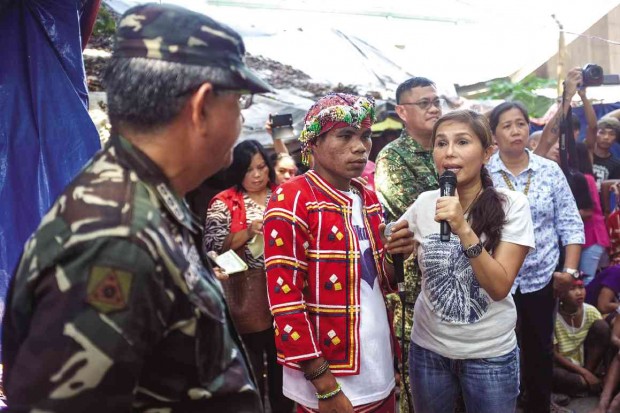
DISPLACED “lumad” said they were insulted by the way the dialogue led by North Cotabato 2nd District Rep. Nancy Catamco was conducted at an evacuation center in Davao City last July 22. KARLOS MANLUPIG/INQUIRER MINDANAO
North Cotabato Representative Nancy Catamco’s proposal to legalize the existence of tribal warriors or baganis (also known as bahanis among some tribes) has gained traction among indigenous peoples (IPs), with at least two tribal leaders becoming very vocal in support for it.
Datu Arcadio Aman of the Kilanan Manuvu ancestral domain claim in Arakan town said the baganis have been important part of their efforts to defend their territories and by government recognition, its existence would be legalized.
Aman, who leads at least 136 baganis armed with such weapons as shotguns, said they have been defending their communities from land-grabbers and other vested interests.
“We have been receiving death threats from non-lumad intruders, who wanted to enter our ancestral domain claim,” he said.
Aman’s ancestral domain claim covers a land area of about 114,000 hectares.
Aman said they banked on a provision of the Indigenous Peoples Rights Act, which says that IPs have all the rights—including the defense of their territories—in maintaining their tribal warriors.
Datu Jaime Udo, a lumad datu in Makilala town, admitted that in most cases, the baganis were ill-equipped against intruders and that only their desire to protect their communities was what makes them fight intruders.
“Legally arming the bagani would ensure an effective defense against land grabbers,” he said.
“Arming the baganis did not mean they will start hostilities. Aman said it has always been the baganis, who played major role in the survival of the IPs.
Catamco’s office said based on data gathering, there were at least 1,250 active bagani forces in five North Cotabato towns alone.
Udo said the reality was that tribal communities had always been a target.
He said as of 2006 alone, 439 lumad had already been killed in defense of their ancestral domains in Mindanao.
“Most of the victims were killed by such intruders as illegal loggers, land grabbers,” he said.
Udo said legalizing the baganis would also spare them from suspicion of being rebels.
“Two of my men were killed when soldiers belonging to Army’s 57th Infantry Battalion clashed with heavily armed rebels inside our ancestral domain. He was killed on suspicion of being a rebel,” Udo said, identifying the slain bagani as Joni Antak.
Last week, Catamco said she would seek the government’s full recognition and regulation of indigenous community defense systems, such as the baganis or tribal warriors, to prevent their exploitation by vested interests.
Catamco, who chairs the House committee on the indigenous peoples, issued the statement amid reports that lumad paramilitary groups have been terrorizing IP communities in Mindanao.
READ: 3 dead in paramilitary rampage in Surigao del Sur town
Recently, the baganis were thrown into the limelight anew after reportedly killing three people in Surigao del Sur on Sept. 1.
Catamco said by legalizing the baganis, they could be effectively controlled and regulated by the government, unlike their shadowy status today.
“The process of recognition will weed out those (who) are posing as baganis, when in fact they are mere armed groups organized by non-IP interests groups,” she said.
Catamco said under her proposal, which she would soon be submitting to Congress after consultations with IP communities, only “authentic defense systems of IP communities borne out of their cultural tradition in preserving their way of life as distinct groups of people and their ancestral domain” should be made legal.
“Regulation will set the rules to ensure compliance with existing laws,” she said.
READ: LP solon wants guns for bagani
Catamco clarified that she was not proposing that the baganis be turned into paramilitary groups such as the Civilian Armed Forces Geographical Unit (Cafgu) although they would be allowed to bear firearms.
She said Cafgus are organized to meet local insurgency threat while the bagani system is part of the historical pre-existing defense system of an IP community.
“Whether armed or unarmed, (they) have evolved from their assertion of their distinct identity, defense of their freedoms, independence, territorial integrity and culture,” she said. http://newsinfo.inquirer.net/723506/tribal-leaders-in-support-for-legalizing-its-warriors

No comments:
Post a Comment
Note: Only a member of this blog may post a comment.